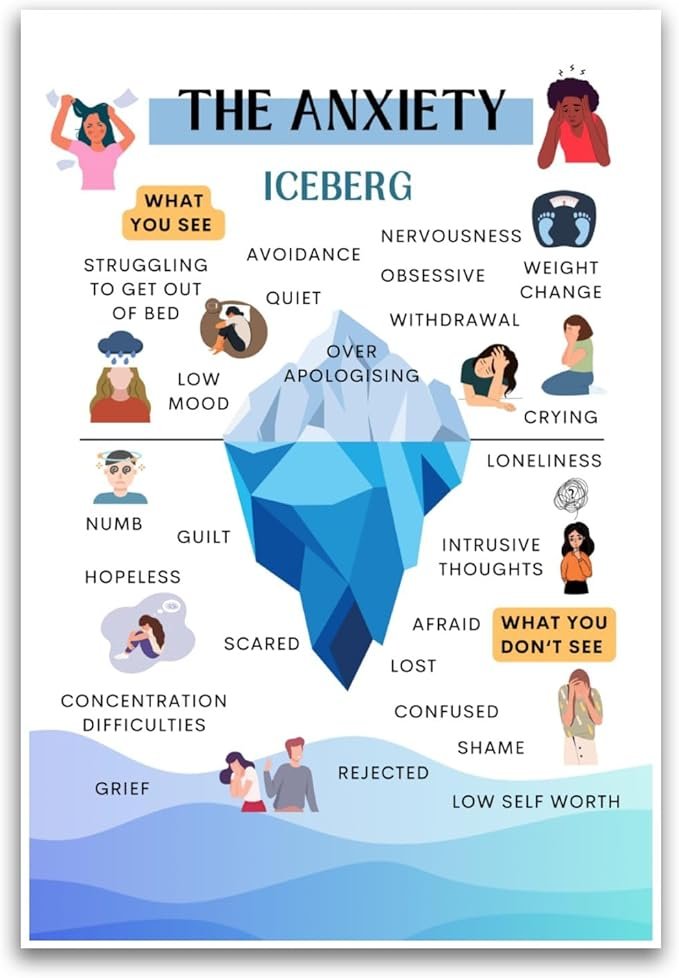
Anxiety is more than occasional worry or stress; it’s a feeling of fear or unease that doesn’t go away and can significantly impact daily life. Anxiety can show up in many forms, from generalized worry to more specific fears, and it can affect people of all ages and backgrounds. Let’s explore what anxiety looks like, what causes it, and how therapy can help you find relief.
What is Anxiety?
Anxiety is a natural human response to stress, but when it’s constant or out of proportion, it can interfere with your life. People with anxiety often describe a persistent sense of dread, a feeling like something terrible is going to happen. Unlike everyday worry, anxiety can feel all-consuming, showing up as intrusive thoughts or physical symptoms like muscle tension and restlessness. Anxiety can also affect your mood and energy, leaving you feeling on edge or drained.
What is an Anxiety Attack?
An anxiety attack is a sudden surge of intense fear or discomfort, often accompanied by physical symptoms like rapid heartbeat, sweating, shortness of breath, or dizziness. It can feel overwhelming and sometimes mirrors the symptoms of a heart attack, which adds to the fear. Specific events can trigger anxiety attacks, or they can seem to come out of nowhere. The experience is different for everyone, but the common thread is a feeling of losing control, with your body reacting as if it’s in immediate danger.
Do I Have an Anxiety Disorder?
Wondering if you have an anxiety disorder? If your anxiety is affecting your ability to function—whether at work, in relationships, or everyday activities—it may be time to look deeper. Anxiety disorders go beyond occasional worry. They involve persistent, uncontrollable feelings of worry, fear, or panic that make daily life harder to navigate. You might find yourself avoiding certain situations or people, struggling to sleep, or feeling overwhelmed by tasks others seem to handle easily.
Anxiety and Anxiety Attack Symptoms
Anxiety symptoms can be both physical and emotional, and they often vary from person to person. Common symptoms of anxiety include:
- Constant worry or racing thoughts.
- Difficulty concentrating or staying focused.
- Irritability and restlessness.
- Physical symptoms like muscle tension, headaches, or digestive issues.
- Sleep disturbances, such as insomnia or nightmares.
- A sense of dread or feeling “on edge.”
Anxiety attacks, on the other hand, are intense and short-lived episodes that may involve rapid heartbeat, sweating, difficulty breathing, and a feeling of losing control. These attacks can be distressing, especially if you’re unsure what’s causing them.
Types of Anxiety Disorders and Their Symptoms
Anxiety isn’t one-size-fits-all; there are several types of anxiety disorders, each with its own set of symptoms:
- Generalized Anxiety Disorder (GAD): Persistent, excessive worry about various aspects of life, often accompanied by physical symptoms like muscle tension and fatigue.
- Panic Disorder: Characterized by recurrent anxiety attacks with intense physical symptoms and a fear of future attacks.
- Social Anxiety Disorder: Intense fear of social situations where you might feel judged, embarrassed, or rejected.
- Phobias: Specific, intense fears about particular objects, activities, or situations, like heights or flying.
- Obsessive-Compulsive Disorder (OCD): Persistent, unwanted thoughts (obsessions) that lead to repetitive behaviors (compulsions) to try to relieve the anxiety.
- Post-Traumatic Stress Disorder (PTSD): Anxiety resulting from traumatic experiences, with symptoms like flashbacks, avoidance, and heightened vigilance.
Each type of anxiety disorder requires a unique approach to treatment tailored to its specific symptoms and impacts.
Anxiety Causes
Anxiety can have multiple causes, from genetics and brain chemistry to life experiences and trauma. For some, anxiety runs in the family, suggesting a genetic link. For others, it may be triggered by stressful or traumatic events, lifestyle factors, or medical conditions. Even chronic stress from work, relationships, or health problems can contribute to anxiety. Understanding the root of your anxiety can be the first step in managing it effectively.
When to Seek Professional Help
If anxiety is taking a toll on your well-being, it’s worth considering professional help. Signs that it’s time to reach out include difficulty managing everyday responsibilities, intense and persistent worry, or physical symptoms like insomnia or frequent headaches. Therapy provides a safe, nonjudgmental space to explore your anxiety, understand its causes, and develop skills to manage it. If stress impacts your quality of life, seeking help can be the first step to feeling more in control.
Anxiety Treatment
Anxiety is highly treatable, and therapy offers a variety of approaches to help you manage it. Common treatments include Cognitive Behavioral Therapy (CBT), which focuses on identifying and changing negative thought patterns; Exposure Therapy, which helps you gradually face and overcome specific fears; and Mindfulness-Based Therapy, which teaches techniques for staying present and managing stress. In addition to these therapies, lifestyle changes, such as exercise, sleep hygiene, and stress management, can also play a significant role in reducing anxiety.
If you’re experiencing anxiety and are ready to take steps toward relief, counseling can provide the support and tools you need. I offer anxiety counseling in Tyler, Texas, and virtually across the state, so you don’t have to face this alone. Reach out today for a consultation, and let’s work together to help you find peace and reclaim control over your life.




